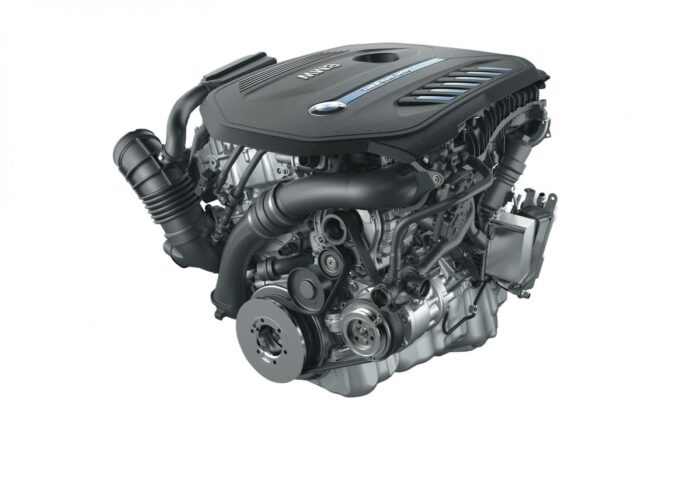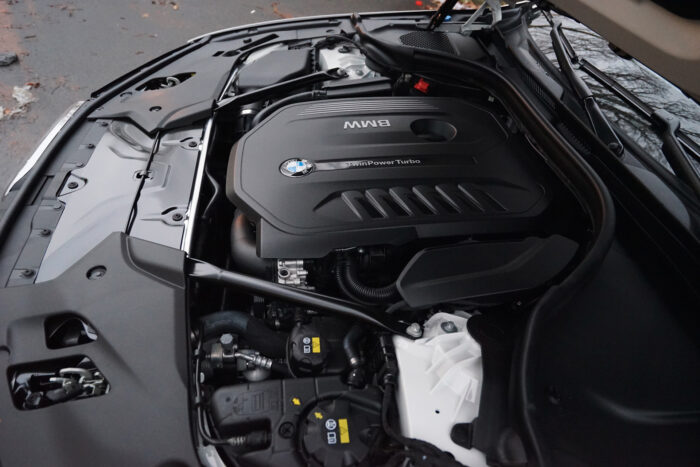The BMW B58 engine is a turbocharged straight-six engine that was first introduced in 2015. It is the successor to the N55 engine and is used in a wide range of BMW vehicles, including the 3 Series, 4 Series, 5 Series, 7 Series, X3, X4, X5, and X6. The B58 engine has been praised for its power and efficiency, but it has also been the subject of numerous complaints from owners who have experienced issues with their engines.
BMW B58 engine design
The B58 petrol six-cylinder units from the modular family appeared in 2015. They are engines with an aluminum block and plasma sprayed steel on the cylinder walls, an aluminum 24-valve cylinder head with hydro-compensators, direct fuel injection, Vanos variable camshafts, Valvetronic system and timing chain drive. For supercharging in these engines is responsible Twin-Scroll turbocharger Mahle / Bosch with an intercooler. It is also worth noting that unlike the B38 and B48 units, there are no balancer shafts.
The B58 engine number is on the front cover
In 2018, there is an updated version known in the technical literature as the B58B30TU. This power unit features a simplified timing drive with one chain instead of two previously, a lightened crankshaft, a new injection system with increased pressure from 200 to 350 bar, and an exhaust manifold built into the block head. As a result, the weight has dropped by 6 kg.
Modifications of BMW B58 engines
We have summarized the technical characteristics of all power units in this lineup in a single table:
| Configuration | Inline |
| Number of cylinders | 6 |
| Number of valves | 24 |
| Displacement | 2998 cc |
| Cylinder diameter | 82 mm |
| Stroke | 94.6 mm |
| Power system | Direct Injection |
| Engine power | 326 – 388 hp |
| Torque | 450 – 500 Nm |
| Compression ratio | 11.0 |
| Fuel type | Premium, Supreme |
| Euro class | EURO 6 |
The dry weight B58 engine is 139 kg

What cars have the b58 engine
There are three families of these motors, with the B58B30M1 and B58B30O1 called the B58B30TU:
| 1-Series F20 | 2016 – 2019 |
| 2-Series F22 | 2016 – 2021 |
| 3-Series F30 | 2015 – 2018 |
| 3-Series F34 | 2016 – 2020 |
| 4-Series F32 | 2016 – 2021 |
| 5-Series G30 | 2017 – 2020 |
| 6-Series G32 | 2017 – 2020 |
| 7-Series G11 | 2015 – 2018 |
| 5-Series G30 | 2020 – … |
| 6-Series G32 | 2020 – … |
| 8-Series G15 | 2019 – … |
| X5-Series G05 | 2018 – … |
| X6-Series G06 | 2019 – … |
| X7-Series G07 | 2019 – … |
| Z4-Series G29 | 2019 – … |
| 2-Series G42 | 2021 – … |
| 3-Series G20 | 2019 – … |
| 4-Series G22 | 2020 – … |
| X3-Series G01 | 2018 – … |
| X4-Series G02 | 2018 – … |
BMW B58 Engine Maintenance
The BMW B58 engine is a turbocharged inline-six engine that is found in various BMW models, including the 340i, 540i, and 740i. It is a high-performance engine that produces up to 382 horsepower and 369 lb-ft of torque. The B58 engine is known for its exceptional power and smooth operation.
Maintenance at 10,000 Miles or 12 Months
- Oil and filter change
- Check tire pressure and tread wear
- Check coolant level and concentration
- Check brake pads, brake fluid, and brake lines
- Check windshield washer fluid level
- Check engine air filter
- Check power steering fluid level
Maintenance at 20,000 Miles or 24 Months
- Oil and filter change
- Check tire pressure and tread wear
- Check coolant level and concentration
- Check brake pads, brake fluid, and brake lines
- Check windshield washer fluid level
- Check engine air filter
- Check power steering fluid level
- Replace cabin air filter
Maintenance at 30,000 Miles or 36 Months
- Oil and filter change
- Check tire pressure and tread wear
- Check coolant level and concentration
- Check brake pads, brake fluid, and brake lines
- Check windshield washer fluid level
- Check engine air filter
- Check power steering fluid level
- Replace spark plugs
Maintenance at 40,000 Miles or 48 Months
- Oil and filter change
- Check tire pressure and tread wear
- Check coolant level and concentration
- Check brake pads, brake fluid, and brake lines
- Check windshield washer fluid level
- Check engine air filter
- Check power steering fluid level
- Replace cabin air filter
Maintenance at 50,000 Miles or 60 Months
- Oil and filter change
- Check tire pressure and tread wear
- Check coolant level and concentration
- Check brake pads, brake fluid, and brake lines
- Check windshield washer fluid level
- Check engine air filter
- Check power steering fluid level
- Replace brake fluid
Engine Maintenance Table
Proper maintenance is essential for the health and longevity of your BMW B58 engine. The following table outlines the recommended maintenance intervals and procedures for the B58 engine:
| Maintenance Item | Interval | Procedure |
|---|---|---|
| Engine oil and filter | 10,000 mi | Change oil and filter with BMW-approved products. |
| Engine air filter | 30,000 mi | Replace with BMW-approved filter. |
| Spark plugs | 60,000 mi | Replace with BMW-approved plugs. |
| Brake fluid | 2 years | Replace with BMW-approved fluid. |
| Coolant | 4 years | Replace with BMW-approved coolant. |
| Transmission fluid | 60,000 mi | Replace with BMW-approved fluid. |
| Differential fluid | 30,000 mi | Replace with BMW-approved fluid. |
| Fuel filter | 60,000 mi | Replace with BMW-approved filter. |
| Battery | 5 years | Replace with BMW-approved battery. |
It’s important to note that these intervals may vary depending on your specific driving conditions and habits. For example, if you frequently drive in extreme temperatures or stop-and-go traffic, you may need to perform maintenance more frequently.
Importance of Regular Maintenance
Regular maintenance is crucial to keeping your BMW B58 engine running smoothly. Failure to follow the recommended maintenance schedule can lead to engine problems, reduced performance, and increased repair costs. By performing regular maintenance, you can detect and fix minor issues before they turn into major problems.

BMW B58 Engine Problems and Reliability
The BMW B58 engine is a powerful and efficient motor that has been praised by many automotive enthusiasts for its performance and reliability. However, like any complex piece of machinery, the B58 engine is not without its problems. In this comprehensive guide, we will examine the most common issues that plague this engine and provide guidance on how to address them.
Oil Leaks
One of the most common problems with the B58 engine is oil leaks. Owners have reported oil leaks from various locations, including the oil filter housing, valve cover gasket, and oil pan. These leaks can result in low oil pressure, which can cause engine damage if left unchecked. If you notice oil leaks from your B58 engine, it is important to have them repaired as soon as possible.
Timing Chain Tensioner Failure
Another common issue with the B58 engine is timing chain tensioner failure. This can cause the timing chain to become loose, which can result in engine damage if the chain slips or breaks. Symptoms of a failing timing chain tensioner include engine noise and rough idling. If you notice these symptoms, it is important to have your B58 engine inspected by a qualified mechanic.
Water Pump Failure
The B58 engine is also known to have issues with the water pump. Owners have reported water pump failures that have resulted in engine overheating and damage. Symptoms of a failing water pump include engine overheating and coolant leaks. If you notice these symptoms, it is important to have your B58 engine inspected as soon as possible.
Carbon Buildup
Carbon buildup is a common problem with direct injection engines, and the B58 engine is no exception. Carbon buildup can cause a range of issues, including reduced engine performance, rough idling, and engine misfires. Regular maintenance, including cleaning the intake valves, can help prevent carbon buildup from becoming a serious issue.
Fuel Injector Problems
Some owners have reported issues with the fuel injectors on their B58 engines. Symptoms of a failing fuel injector include engine misfires, rough idling, and reduced engine performance. If you notice these symptoms, it is important to have your B58 engine inspected by a qualified mechanic.
Reliability of the BMW B58 Engine
Despite the common problems outlined above, the BMW B58 engine is generally considered to be a reliable motor. Proper maintenance and regular inspections can help prevent many of the issues that owners have reported. In fact, many owners have reported trouble-free operation of their B58 engines for tens of thousands of miles.
Conclusion
The BMW B58 engine is a powerful and efficient motor that has received high praise from automotive enthusiasts. However, it is not without its problems. Owners have reported issues with oil leaks, timing chain tensioner failure, water pump failure, carbon buildup, and fuel injector problems. Fortunately, many of these issues can be prevented with proper maintenance and regular inspections. Despite the problems, the B58 engine is generally considered to be a reliable motor that can provide trouble-free operation for many miles.
Options for BMW B58 Tuning
There are various options for BMW B58 tuning, depending on your goals and budget. Some popular options include:
- ECU remapping: This involves modifying your engine’s software to optimize its performance, fuel efficiency, and other parameters. ECU remapping can provide significant gains in power, torque, and throttle response.
- Performance exhaust system: Upgrading your exhaust system can improve airflow, reduce backpressure, and enhance your engine’s sound and performance.
- Cold air intake: Replacing your engine’s air intake with a cold air intake system can increase airflow and reduce intake temperature, resulting in more power and better throttle response.
- Upgraded intercooler: Installing a larger or more efficient intercooler can reduce intake temperature, improving engine performance and reliability.
- Turbocharger upgrade: Replacing your stock turbocharger with a larger or more efficient one can significantly increase power and torque output.
Techniques for BMW B58 Tuning
Tuning your BMW B58 engine is a complex process that requires expertise and specialized tools. Here are some techniques involved in BMW B58 tuning:
- Data logging: This involves collecting data on your engine’s performance, including boost pressure, air/fuel ratio, ignition timing, and other parameters. This data is then used to optimize your engine’s software and hardware.
- Dyno tuning: This involves testing your car on a dynamometer, which measures its power output and other parameters. This data is then used to fine-tune your engine’s software and hardware for maximum performance and reliability.
- Custom tuning: This involves creating a customized tuning map for your specific engine and driving style. A skilled tuner will take into account various factors, such as environmental conditions, fuel quality, and driving habits, to create a personalized tuning solution for your BMW B58 engine.
0 Comments